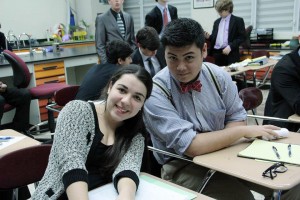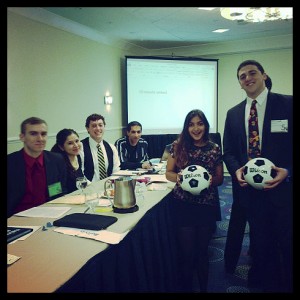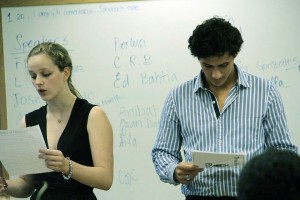Walking as a timid eighth grader into the lobby of a beautiful hotel, the site of my first stateside Model UN conference, I didn’t have a clear idea of what to expect. One thing I did assume, however, was that each and every one of the three thousand delegates in attendance did Model UN for the same reasons I did: a passion for learning and a love of diversity. That idea was dashed when I was asked, as a Puerto Rican student, why I looked “fairly white.” The fact of the matter is that I am, for better or for worse, as pale as a ghost. If I had said I was from anywhere within the contiguous United States, chances are that there would have been no question of my “whiteness” (whatever that’s supposed to mean) in this delegate’s head.
This narrative is the same for the scores of delegates representing diverse cultural backgrounds. I have realized now, however, that people will not, and should not, participate in MUN for the same reasons. Many people will invariably join this organization in order to boost their high school transcripts or because their parents thought it would be a good idea. And that’s OK. They may well see the long-term benefits of having done MUN sometime in the future. We shouldn’t expect every delegate to know the particulars of any given culture by pure virtue of their involvement in the club. What’s not OK, however, is when this ignorance isn’t recognized and addressed in an appropriate manner.
Every delegate has the right to experience MUN in his or her own way. They do not have the right, however, to negatively affect the experiences of others. Conference organizers would also do well by remembering this. For every delegate who throws a culturally insensitive remark, there is a member of staff who is allowing this negative environment to fester. That being said, it is important to recognize that it is virtually impossible to stamp out this kind of behavior in its entirety. Expecting a conference to do so is very unfair to them. There several things they can do to address the issue, however.

Two delegates and good friends from different schools pause their caucusing to smile for the camera (Photo credit: Ana Mercedes Colón)
Strict policies and enforcement of anti-bullying rules are, of course, a must. It should be the absolute obligation of a staffer to report any instances of bullying as soon as he or she sees it. The conference, in conjunction with the delegate’s faculty advisor, should then determine what the appropriate course of action is. But sometimes that isn’t enough. What a conference appears to sponsor sets the tone for the entire event. This includes everything from keynote speakers to the attitudes of the dais.
During one recent conference, a keynote speaker gave a speech concerning political liberties worldwide that was considered insensitive to some international delegates. Hundreds of these delegates, offended, decided to leave the room. One of these students said that it was not the place of any conference to “impose opinions” on its attendees and called the speech “ridiculous.” Another pointed out that “everyone has an opinion, but one’s position of authority should not be abused.” Though a keynote speaker is not directly affiliated with the conference in which he or she speaks, that conference is immediately associated with whatever is said during the presentation. Should unforeseen events such as this one occur, all conferences should replicate the measures taken by this particular one. The matter was discussed during the moderators’ meeting and a private Q&A session with the offended schools was held in their native language.
Clearly, there are ways for conference organizers to prevent their hard work from being tarnished by cultural insensitivity. Nevertheless, the process of stamping out the attitudes that lead to this type of bullying needs to start within individual clubs. A club or school that fosters an atmosphere of ignorance will encourage their students to think it’s OK to abuse others. Even scarier is the prospect of creating a generation of MUNers who don’t even realize that what they are doing is wrong. If that happens, then the battle will have been lost. Ultimately, this kind of conduct in MUN is a paradox. How can an activity dedicated to expanding students’ cultural horizons be the venue for such intolerable behavior? It is up to each and every participant to ensure that this doesn’t become the norm, and I am confident that this generation will never allow that to happen.

Delegates from the NAIMUN L FIFA committee come together after debating about the effects of racism in competitive football (Photo credit: NAIMUN L Press Corps)


